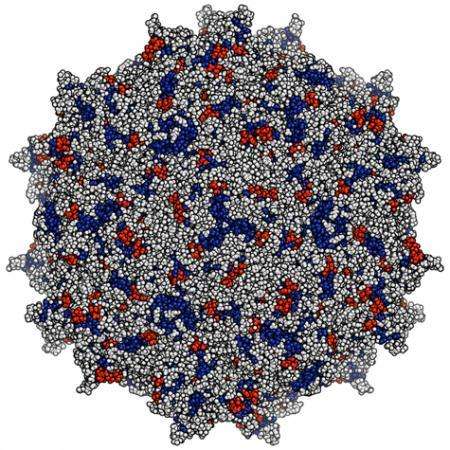Researchers develop promising method for delivering HIV-fighting antibodies

(Medical Xpress)—In 2011, biologists at the California Institute of Technology (Caltech) demonstrated a highly effective method for delivering HIV-fighting antibodies to mice—a treatment that protected the mice from infection by a laboratory strain of HIV delivered intravenously. Now the researchers, led by Nobel Laureate David Baltimore, have shown that the same procedure is just as effective against a strain of HIV found in the real world, even when transmitted across mucosal surfaces.
The findings, which appear in the February 9 advance online publication of the journal Nature Medicine, suggest that the delivery method might be effective in preventing vaginal transmission of HIV between humans.
"The method that we developed has now been validated in the most natural possible setting in a mouse," says Baltimore, president emeritus and the Robert Andrews Millikan Professor of Biology at Caltech. "This procedure is extremely effective against a naturally transmitted strain and by an intravaginal infection route, which is a model of how HIV is transmitted in most of the infections that occur in the world."
The new delivery method—called Vectored ImmunoProphylaxis, or VIP for short—is not exactly a vaccine. Vaccines introduce substances such as antigens into the body to try to get the immune system to mount an appropriate attack—to generate antibodies that can block an infection or T cells that can attack infected cells. In the case of VIP, a small, harmless virus is injected and delivers genes to the muscle tissue, instructing it to generate specific antibodies.
The researchers emphasize that the work was done in mice and that the leap from mice to humans is large. The team is now working with the Vaccine Research Center at the National Institutes of Health to begin clinical evaluation.
More information:
"Vectored immunoprophylaxis protects humanized mice from mucosal HIV transmission." Alejandro B Balazs, Yong Ouyang, Christin M Hong, Joyce Chen, Steven M Nguyen, Dinesh S Rao, Dong Sung An, David Baltimore. Nature Medicine (2014) DOI: 10.1038/nm.3471
Received 03 October 2013 Accepted 07 January 2014 Published online 09 February 2014
















